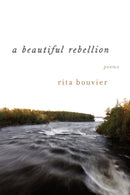Description
Rita Bouvier is a Métis writer and educator from Saskatchewan. These poems speak with a fierce tenderness of many aspects of the poet’s life: a childhood spent on the banks of the Churchill River, the death of a beloved one, the struggle to try to find forgiveness for wrongs done to her people and the weariness of trying to redress those wrongs. a beautiful rebellion reaches one hand back to Louis Riel and one hand ahead to future Métis generations.
There is a quiet power—riverine, deep, unstoppable—that flows through these words, as Rita Bouvier takes us paddling on the Churchill River, or on snowshoes across a frozen lake, or shows us quiet intimacies between family members. A few of the poems are like invocations, speaking directly to her people, to Louis Riel’s descendants, the men and women and children who must make the best of their lives, often under difficult circumstances. Rita Bouvier asks that we honour the tragedies that have befallen her ancestors but also take heart at this generation’s achievements—and celebrate their knowledge and strength and resilience.
The poems address the kind of losses we all suffer when the world of our childhoods has altered irrevocably, yet they also reveal the pain of residential school survivors, and despair at the lack of progress in social justice and self-determination. These poems are intimate and insightful, written in inviting, open-hearted language that includes many Cree and Michif phrases and their translation.
There is a quiet power—riverine, deep, unstoppable—that flows through these words, as Rita Bouvier takes us paddling on the Churchill River, or on snowshoes across a frozen lake, or shows us quiet intimacies between family members. A few of the poems are like invocations, speaking directly to her people, to Louis Riel’s descendants, the men and women and children who must make the best of their lives, often under difficult circumstances. Rita Bouvier asks that we honour the tragedies that have befallen her ancestors but also take heart at this generation’s achievements—and celebrate their knowledge and strength and resilience.
The poems address the kind of losses we all suffer when the world of our childhoods has altered irrevocably, yet they also reveal the pain of residential school survivors, and despair at the lack of progress in social justice and self-determination. These poems are intimate and insightful, written in inviting, open-hearted language that includes many Cree and Michif phrases and their translation.


